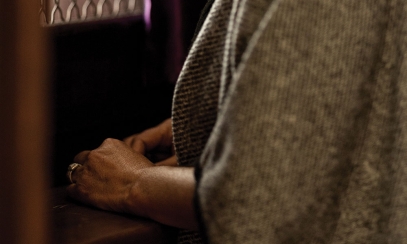
When we feel like hypocrites and phonies
I sometimes feel like a hypocrite when I say that I believe in God and am Catholic, but then I don’t always live the way I should live as a disciple of Jesus. I try to follow God, but I keep failing, and I feel like a phony.
I sometimes feel like a hypocrite when I say that I believe in God and am Catholic, but then I don’t always live the way I should live as a disciple of Jesus. I try to follow God, but I keep failing, and I feel like a phony.
I really appreciate your asking about this. If we go back to the Gospels, we see that Jesus has his harshest words for those whom he calls “hypocrites.” He has incredibly strong words of condemnation for those who claim religious uprightness but are not living that out. We hear these words at the beginning of each Lent in the Sermon on the Mount.
Jesus says: “Take care not to perform righteous deeds in order that people may see them; otherwise, you will have no recompense from your heavenly Father … When you pray, do not be like the hypocrites, who love to stand and pray in the synagogues and on street corners so that others may see them … When you fast, do not look gloomy like the hypocrites. They neglect their appearance, so that they may appear to others to be fasting. Amen, I say to you, they have received their reward ….” (Mt 6:1,5,16)
To each of these behaviors, Jesus reveals the emptiness and futility of “posturing.” He goes even further to let us know that we continue these behaviors at our peril.
But what kinds of behaviors is Jesus actually talking about? Is he saying that praying, fasting and almsgiving are bad? He most definitely is not, since he goes on to say, “When you pray … when you fast … when you give alms ….”
Is he saying that a Christian is a failure if someone else notices and knows that you are praying, or fasting or giving alms? Did Jesus say that you have to keep all of your good works secret? Absolutely not. While Jesus does tell us to “not let your left hand know what your right hand is doing” whilst giving alms, and to “pray to your Father in secret,” he also makes it clear that “your light must shine before men, that they may see your good works and glorify your Father who is in heaven.” (Mt 5:14-16) Our good works must become known at some point so that God may be glorified.
And this is the key.
When Jesus condemns hypocrisy, we need to know what “hypocrisy” actually is. It is not striving to do God’s will and failing. Hypocrisy is “pretending” to be other than we actually are. The very term “hypocrite” comes from the Greek word for “actor,” a person who is pretending to be someone other than who they truly are. The fact that Jesus is focusing on this aspect of behavior is even more clear when we examine how he describes these actions. He outlines these actions by highlighting their motive: they “perform righteous deeds in order that people may see them.” They “love to stand and pray … so that others may see them.” “They neglect their appearance … so that they may appear to others to be fasting.”
The goal is entirely “impression management.” They want to have the appearance of virtue without the presence of virtue. The goal is, “I want you to think that I have that which I am not willing to choose.” “I want you to think I am who I am not willing to become.”
This is, essentially, acting – pretending. This is hypocrisy.
So let’s get back to you. You said that you feel like a hypocrite. It sounds like you are striving to follow Jesus and still find yourself failing to live the way Christ is calling you to live. That is not hypocrisy. That is called being a fallen human being who is striving to live by God’s grace. This is good news! You are not necessarily a hypocrite, you are just broken — like the rest of us.
Now, all of this comes with a note of caution. We do live in a day and age where hypocrisy has some clout, not when it comes to prayer, fasting and almsgiving but when it comes to the temptation toward a relatively new way of describing an old phenomenon. I mean the term “virtue signaling.”
Virtue signaling is the most modern form of hypocrisy. It is pretending to the extreme. It is the antithesis to actual virtue. Where true virtue often comes at great cost, virtue signaling costs nothing. Where real virtue demands that I may have to take an unpopular stand for my deepest convictions, virtue signaling almost always agrees with whichever opinion is most popular in a given culture.
Now, of course, I can do something simply because I have been asked to do it (provided that it doesn’t violate God’s law or my conscience). We all do this to some degree, and this is not necessarily hypocritical. I pay taxes although I do not like paying them. I will go where my bishop asks me to go solely because he has asked me to go there. When I was younger, I went to school and church because my parents told me to. I didn’t do my homework because I always had a great love of learning but because the people who had authority over me told me to.
One way to know if you or I have fallen into modern-day hypocrisy and virtue signaling is to ask the questions: “Have I found myself ever saying something simply because it was expected of me … even if I didn’t believe it?” Or to ask: “Have I ever found myself not saying something that I believed simply because it was unpopular?”
Have I found myself only doing or saying a thing simply so that others would notice? If I have, then I need to take another look at my heart and my motivations to make sure I am not merely pretending, to make sure I am not a hypocrite.
Father Michael Schmitz is director of youth and young adult ministry for the Diocese of Duluth and chaplain of the Newman Center at the University of Minnesota Duluth. Ask Father Mike is published by The Northern Cross.



